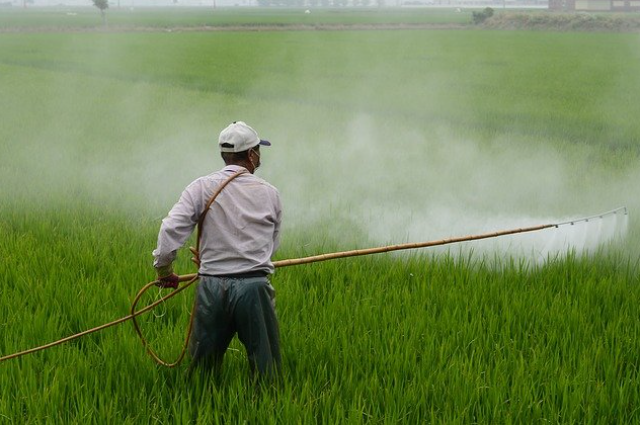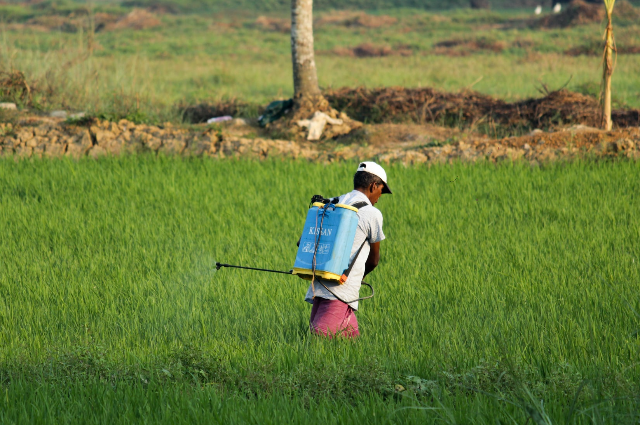
Agriculture is the backbone of our country. To boom the production and to serve millions of tables, agriculture is undergoing a revolutionary change. This change is enhanced by excess use of pesticides.
Problems with Farming Practices of India
- Farmers and local tribes are devoid of rights over natural resources.
- Farmers are not trained or educated regarding percentage use of pesticides on every crop.
- Farming lessons can never be taught in classrooms.
- Agricultural Universities must give on-field education to farmers and students.
- Agricultural Universities and scientists must volunteer to enlighten farmers on correct use of pesticides.
- Seeds of good quality must be preserved.
- Tribals must be actively involved and their expertise be used in farming.
- Farmers and tribals must be treated with dignity.
- Organic and Mixed farming must be encouraged.
- Importance must be given to the indigenous and the native crop.
- Farming must be treated as an elite profession, not a poor man's job.
Let all organisations including school's, colleges, tech giants, etc. participate in Weekend Farming - 'BOND WITH NATURE'
Pesticides - These are toxic biocides and usually synthetic used for prevention of vector borne diseases and crop production.
There is a growing concern about children's vulnerability and susceptibility at both high and low levels of exposure to pesticides.
What does Pesticides do to Children?

- Even low levels of pesticides can affect children's neurological, psychomotor and behavioural development.
- Baby's immature liver and kidneys cannot remove pesticides from body.
- Children born to mothers with occupational pesticide contact exhibit deficit in visual memory and motor speeds.
- Long exposures can also result in autism and ADHD (Attention deficit hyperactivity disorder)
- Children face acute respiratory and skin problems.
- Acute exposures can lead to dizziness, weakness, headaches, nausea.
- Long term exposure can lead to birth defects, learning disabilities, asthma, and organ damage.
- DDT, Mercury, and other compounds undergo biomagnification and cause tissue damage and bone deformation.
- Adolescents can show stunt growth, neuromuscular problems, behavioural problems, and onset of early puberty in boys and girls.
- Human growth and development, maturation of brain canals can also be hampered.
- Even sea food is not spared, especially when soil is eroded from agricultural lands to water bodies.
MOTHER'S MILK

- Lead, mercury, arsenic, cadmium are of concern to the nursing infant.
- Recent studies worldwide has shown presence of PBDEs (polybrominated diphenyl ethers) heptachlor, hexachloro benzene, and even banned POPs (Organo chlorine pesticides) in mother's milk.
- The premature infant maybe more vulnerable due to impaired elimination mechanisms.
- Infants' skin absorbs around 3 times more pesticides than adults ( even while playing in parks, lawns, gardens, etc ). Cattle milk also shows high levels of pesticides.
Prevention
A. Agricultural sector:
- Determine the toxic materials in agricultural pesticides.
- Eliminate pests by keeping surroundings clean.
- Check toxicity levels in cattle
- too ( meat and milk ).
- Pesticide residue values must constantly be monitored.
- Organic farming and the use of natural herbs as pesticides must be considered with the help of tribals and farmers.
- Educate farmers on Conventional IPM ( Integrated Pest Management ).
- Amount of pesticide to be used should always be monitored ( tolerance levels ).
- Proper identification of pest is required.
- Before pest becomes a problem, null it at the source itself.
- Improve the immunity/resistance of the host plant through genetic engineering techniques.
B. In your Garden/Home:
- Use the least toxic pesticides.
- Give plenty of time for pesticide if sprayed to dry.
- Be sure children wear proper masks and clothing while pesticides are sprayed and while playing in parks or lawns.
- Wash vegetables and fruits thoroughly. Even hands must be washed thoroughly.
C. Industrial Level:
- Pesticides and chemical factories dealing with agricultural products should regularly dispose off waste only after treatment.
- Making strict regulations during manufacture of pesticides is a must.
- Pesticide residues should never contaminate ground water or soil.
- Even fumes or smoke from pesticide factory can choke due to its poisonous nature hence be treated properly.
- Biological pest control measures can be adopted such as herbivory, parasitism, and predation.
- Precautions must be taken even while burning agricultural stubble.
PESTICIDES & GOVERNMENT

Pesticide Act, 1968 and 1971 entitled to regulate the import, manufacture, sale, transport, distribution, use, and disposal of insecticides to prevent risk to human beings and environment.
Pesticide Management Bill of 2020 also aims for same but fails to discuss the issues like protection of pesticide users, risks arising from pesticides, reduction and mitigation measures, and protection of community and environment. So, it can be told that it has poor implications on health and environment.
Pests of nature can be nipped off by conventional and tolerance levels of use of pesticides but pest in the minds of humans like greed, looking down upon farmers and tribes, unhealthy, toxic, and cheap practices have to be controlled immediately.
We build the future. Let's make the future mentally and physically strong.
Live Healthy, Live with Dignity !!!
. . .
Reference:
- Related articles by EPA (Environmental Protection Agency)
- NPIC(Natural Pesticide Information Centre)
